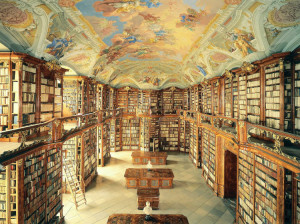 It remains a common assumption that individuals who went to Catholic Colleges are much more informed about their faith than those who did not. That may have been true in the past, but as Fr. Dorian Llewelyn S.J. has noted, it may no longer be the case because since 1967 many Catholic colleges have been outside Catholic authority. Thus, for a long time Catholic college professors, like those at other institutions, have tended to be “on the political and cultural left,” and therefore “less likely to support Catholic teaching on sexuality, gender, and the sanctity of life, or to have a religious outlook.” He adds that such education denies “what old-time Catholic colleges provided excellently: a formative experience where faith is valued and integrated into thinking in all aspects of college life.”
It remains a common assumption that individuals who went to Catholic Colleges are much more informed about their faith than those who did not. That may have been true in the past, but as Fr. Dorian Llewelyn S.J. has noted, it may no longer be the case because since 1967 many Catholic colleges have been outside Catholic authority. Thus, for a long time Catholic college professors, like those at other institutions, have tended to be “on the political and cultural left,” and therefore “less likely to support Catholic teaching on sexuality, gender, and the sanctity of life, or to have a religious outlook.” He adds that such education denies “what old-time Catholic colleges provided excellently: a formative experience where faith is valued and integrated into thinking in all aspects of college life.”
More than fifty-five years have passed since Catholic colleges became secularized. Over that time three generations of Catholic students absorbed what they believed to be a genuinely Catholic perspective on human nature, family life, citizenship, government, and religious faith. That belief may have at first been somewhat accurate, but over time it became less so, and eventually became, in many cases, very inaccurate. Those graduates, over 25 million in total, went on to careers in medicine, law, science, education, government, business, and many other fields. Some became priests. Some in time taught in seminaries, including individuals Fr. Andrew Greeley dubbed the “Lavender Mafia,” men who lived and cultivated in their students views of sexuality diametrically opposed to Catholic teaching. Moreover, those seminary students became priests and in some cases bishops and cardinals.
These facts help to explain not only why so many Catholics have left the Church, but also why many laypeople who still consider themselves Catholic regard their faith as a personal matter with little or no application to their professions, be they medicine, law, science, education government, or business, or for that matter to their parenting. The secular teachings that dominated their education understandably continued that domination after graduation.
These facts also explain why many of today’s Catholic prelates seem to lack the motivation to forcefully challenge the moral outrages that surround us today. One could easily conclude that they either embrace “progressivism” and “wokism,” or at least are accustomed enough to such radicalism to be tolerant toward it. But if we stop to think about it for a moment, we realize that they received the same intellectual conditioning as the laypeople they went to college with. Even if that conditioning was countered in the seminary (which was not always the case), it was surely not erased and was easily revived when they re-entered the general culture.
That “revival” is likely to prompt a negative reaction to every idea or policy or program offered by conservatives for the sole reason that it is offered by conservatives. If such people have seen enough mainstream news, as their professors will have taught them to do, they will have memorized the mantra that conservatives are “heartless racist warmongers who hate both God and neighbor and wish to destroy our country.” (I may be exaggerating the mantra, but not by much.)
The great irony here is that the Catholic Church has never been a “progressive” or “woke” church, as many prelates seem to believe. It has instead been a conservative church with conservative values and a conservative catechism. By this I mean that its focus has been on conserving (aka, preserving) that which God has revealed to be good and two millennia of experience have proven wise.
The Catholic Church desperately needs to renew its historic conservatism, and the Bishops and Cardinals need to lead the effort with the help of informed laypeople. The way to do so is to restore Catholic wisdom and the values that flow from it. Subsequent essays will suggest specific goals and strategies.
Copyright © 2023 by Vincent Ryan Ruggiero. All rights reserved.



